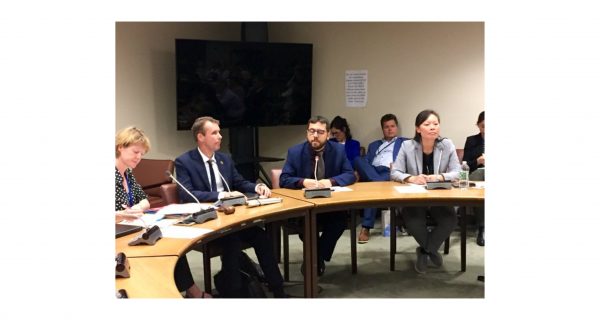US$ 9.5 trillion is the estimated amount spent worldwide on the public procurement market per year on products, services, and infrastructure which are fundamental in people’s everyday lives: transport, healthcare, education, social protection, technologies or how our cities are designed. If accessibility is required, public procurement can be a means to support the inclusion of persons with disabilities, and to implement the UN Convention on the Rights of Persons with Disabilities (UN CRPD).
To discuss different approaches to accessibility and public procurement, on June 13th, the European Disability Forum, with support of the European Commission, the International Disability Alliance, the Pacific Disability Forum and Siteimprove organised a side event at the Conference of State Parties to the UN CRPD. The discussion was facilitated by the moderator Catherine Naughton, Director of the European Disability Forum, with questions to the panellists as well as from the audience.
Katherine Eng, Senior ICT Accessibility Specialist at the US Access Board, explained the legal framework for the US federal public procurement. As part of this legislation, its Section 508 sets out the technical accessibility requirements that are required for ICT that is procured, developed, maintained or used by the federal government.
Very much aligned with the US, European Public Procurement legislation makes accessibility compulsory. Recently the European Union has passed a new legislation, the European Accessibility Act, that provides accessibility requirements to be used in public procurement. Inmaculada Placencia Porrero, Senior Expert on Disability of the European Commission, presented the provisions in EU law that makes accessibility as a mandatory consideration in public procurement, as well as allow for its use as an award criterion, so the procurers can choose the most accessible solution proposed by the bidders. She indicated the availability of EU level accessibility standards to facilitate and support the procurement process, such as the European Standard for accessible ICT.
Alejandro Moledo, EDF Policy Coordinator, reminded the audience about the position of the CRPD committee at the General Comment nº2 on accessibility, calling State Parties to include accessibility in their public procurement legislation. Moledo also stressed the key role of representative organisations of persons with disabilities in shaping those policies and the accessibility standards to underpin the laws, and regretted the lack of redress mechanisms for citizens when they find out that a publicly procured product, service or infrastructure doesn’t live up to these standards.

Laisa Vereti, Manager – Planning Policy and Advocacy at the Pacific Disability Forum presented the situation in the Pacific region, where there is not a comprehensive understanding of accessibility beyond the built environment yet. Vereti also shared the experiences of organisations of persons with disabilities in the region catalysing the process to come up with a “blue print” for different accessibility domains to guide the governments to ensure that procurement of goods and services is accessible and inclusive of persons with disabilities.
Representing Siteimprove, an international Software-as-a-Service, Stein Erik Skotkjerra, Head of Accessibility Relations, emphasized that there is a positive trend towards having legal requirements for accessibility in public procurement. In his experience, legal requirements are one of several triggers that increase the focus on accessibility in general, along with awareness and training on accessibility, as proved by their work with the Accessibility World Map. However, Skotkjerra also pointed out that there is the need for sharing knowledge so that more manufacturers know how to create accessible and user-friendly products. Besides the obvious business case to do so, without this knowledge sharing, vendors will not be able to deliver accessibility, despite the legal requirements in procurement policies.
Finally, Ursula Wynhoven, representative of the International Telecommunication Union to the UN, showed the different resources that they have developed to support countries to mainstream accessibility in their procurement policies, such as trainings, policy models, checklists and guidelines for accessible meetings.